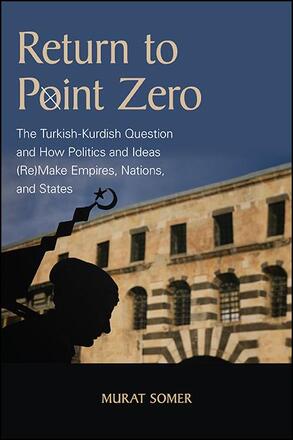
Return to Point Zero
The Turkish-Kurdish Question and How Politics and Ideas (Re)Make Empires, Nations, and States
Alternative formats available from:
Analyzes Turkey’s Kurdish conflict since post-Ottoman nation-building through recent peace attempts, from a novel perspective highlighting the dilemmas of the Turk majority and reshaping our understanding of ethnic conflicts, and offers solutions for a sustainable peace.
Description
How did the Turkish-Kurdish Conflict arise? Why have Turks and Kurds failed for so long to solve it? How can they solve it today? How can social scientists better analyze this and other protracted conflicts and propose better prescriptions for sustainable peace? Return to Point Zero develops a novel framework for analyzing the historical-structural and contemporary causes of ethnic-national conflicts, highlighting an understudied dimension: politics. Murat Somer argues that intramajority group politics rather than majority-minority differences better explains ethnic-national conflicts. Hence, the political-ideological divisions among Turks are the key to understanding the Turkish-Kurdish Conflict; though it was nationalism that produced the Kurdish Question during late-Ottoman imperial modernization, political elite decisions by the Turks created the Kurdish Conflict during the postimperial nation-state building. Today, ideational rigidities reinforce the conflict. Analyzing this conflict from "premodern" times to today, Somer emphasizes two distinct periods: the formative era of 1918–1926 and the post-2011 reformative period. Somer argues that during the formative era, political elites inadequately addressed three fundamental dilemmas of security, identity, and cooperation and includes a discussion of how the legacy of those political elite decisions impacted and framed peace attempts that have failed in the 1990s and 2010s. Return to Point Zero develops new concepts to analyze conflicts and concrete conflict-resolution proposals.
Murat Somer is Professor of Political Science and International Relations at Koç University in Istanbul, Turkey.
Reviews
"…readers should find Somer's latest contribution to the field very useful, insightful, and original." — Middle East Journal
"With its rich and sophisticated analysis, Return to Point Zero makes a major contribution to the social sciences literature on Turkey. In addition to helping us understand the Kurdish problem in all its complexity, Somer takes the additional step of suggesting practical ways of overcoming the difficulties and moving toward solutions. This is an important book that will influence how we think about modern Turkey for many years to come." — Reşat Kasaba, University of Washington
"In this highly original and sensitively written analysis, Murat Somer elucidates how the Kurdish Question became the Kurdish Conflict, and in doing so provides a cogent and clear-headed explanation for why the Kurdish-Turkish conflict has continued to persist and what needs to be done if it is to be transcended." — Mark R. Beissinger, Princeton University
"Somer's deeply informed monograph puts emphasis on multiple and contradictory processes that determined and still determine the evolution of the Kurdish conflict in Turkey and opens new theoretical avenues to understand dynamics of ethnic conflicts throughout the twentieth and twenty-first centuries." — Hamit Bozarslan, École des Hautes Études en Sciences Sociales (EHESS)
"This is a major contribution to the understanding of nationalist politics. Eschewing reductionist or mechanistic explanations, Somer provides a theoretically sophisticated and empirically rich account of the emergence of Turkish and Kurdish nationalisms and shows how the conflict is not historically inevitable or predetermined." — Michael Keating, University of Aberdeen